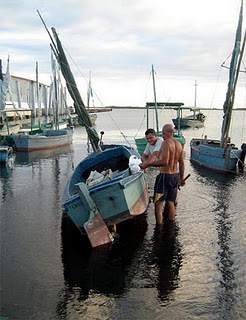
[In this part of an unedited interview, which I don’t know when it will be published, I respond to the question: “Ciego de Ávila: Love or scorn?”]
I have tried to invent the province lovingly, although for that I had to give a primary form to that love without obligation until it was more or less justified physically. You know what I mean: it was given to me to work on magazines, research, anthologies, events, etc. Anyway, I was wasting my time, “plowing the sea” as we say. I knew that eventually the community where I had lived would not forgive me, and so it has been — fortunately, I must say.
Reality and abstraction merge dramatically in provincial life, love and scorn depend on knowing how to distinguish and connect them. In a highly centralized society, all imaginative communication hangs on a few strange threads, and this is experienced with more tension at the lower levels of the social order, as in the small political boundaries. The pressure that, with regards to my fantasies, exerted by the corner I inhabit it Cuba, my residence in the absence of water surrounded by water on all sides*, definitively results, for me, in a candid inferno. At times I explain it to myself as a liquidation and generational auction.
As much as the redefining of historical stages may seem trivial to me, I am one of those young people — tempering here classifications such as poet, writer or intellectual — who burst on the scene at the beginning of the ’90s, with the fall of the Berlin Wall and the so-called “Special Period.” I understand my way through this historic turning point that continues up to today, this dismantling of large belief systems, which helps me to explain my particular agonizing relationship with my environment.
We go out into the street — similarly some of us take up poetry — to earn a living by tooth and nail, expecting freedom and giving it to ourselves. Iconoclasts, we trample on the fears of many of the people we’ve grown up around. We defend our right not to be State employees and not to fall prey to the famous and feared Law of Dangerousness.
Most of us have given up our studies halfway through, or at least when any hope in the logical scale of social advancement through the bureaucratic system collapses. We are the laborers in clandestine businesses and the black market, ignorant of the Revolutionary modesty and ethics that calls on us to die of hunger before letting ourselves be corrupted by the supposed vices of capitalism. Then, we even define ourselves as poets when some official comes by asking how we’re different from the lumpen.
We ruined meetings, accusing the bureaucrats of the presidency, we questioned, we spoke up, we played the classic opportunistic chess poorly because we captured pieces in all directions, we didn’t have the grace to get in good with the boss. We asked, of course, that the Hermanos Saíz Association cut itself off from the other political organizations and become independent. We had nothing and aspired to much less. We flat out refused to be domesticated. We had to reject the first time someone edited and approved a poem we were going to recite in an activity the following day, for the first time we told the “secret” agent who always presided over the Literary Workshop to shut up.
We went to church and tried to carry the Virgin on a procession when it was frowned upon and prohibited. Our poems spoke freely of religious beliefs, suicide fantasies, different sexual preferences, or the sublime desire to emigrate; we severed ourselves from the tyrannical deadly placenta, killing the mother and burning the city. We quoted each other and shared the experiences of the exiles, making direct comparisons with the cursed readings and tragic events of Stalinism.
We had to stop using, in essays and criticisms, classifications such as “Revolutionary literature” that had been commonplace until then, and mandatory tests to pass to the next level. Unthinkably, a recognized group shame came over us with the introduction to the anthology Usted es la culpable (You are Guilty), in 1985, where we almost asked forgiveness for living.
Following the takeover, by the powers-that-be, of colloquial discourse after the Triumph of the Revolution, no generation had been so free. At our side, many of the authors of the decade immediately before, those of the great axiological bankruptcy, and especially those who had not swelled the diaspora, suffering the ravages of the ideological uproar: self-censorship, delusions of persecution, deep remorse, psychological scars, as a consequence of the forced learning when the control of artistic activity was still staged, a shock treatment undertaken directly by police dressed as peasants.
The churches overflowed and every Sunday, Mass-as-catharsis brought a collective prayer for those who threw themselvesinto the sea on a raft. We walked the country from house to house listening to banned radio or the cassettes of so many musicians targeted on the blacklist. Nobody lowered his voice while standing in line to echo jokes and anonymous parodies of poems and songs. There was a euphoria paradoxically coinciding with the consciousness of hitting bottom. Our psychic freedom was so spontaneous and vital that we felt ourselves above reality, noting our own detachment and spiritual independence, ignoring the fact that the macrosocial circumstances would remain the same as those suffered by other generations in the hard gray years.
Perhaps we trusted that sooner or later history would have to catch up with us and put itself in tune with our inner world and everything out there would be removed. What happened afterwards? Of course we didn’t change life. We just spent our youth and there was another turn of the screw they gave — and continue giving — others.
I hardly know if I distinguish good from within an experience so tight that it leaves me short of breath, but when I look around I notice that the generation of the ’80s that didn’t emigrate, for the most part they have adapted better, continued the evolutionary heritage of the coloquialists, the Generation of the ’50s, skilled in reaching the power on high and touching its intimate and popular fiber.
Just as there is a “historic” generation that toppled the Batista tyranny and took the baton for life, there is a poetic generation that, within the aesthetic ideals of the process acquired, early on, the same equivalence as the supposed opponents of the old bourgeois sensibility which has been accruing the benefits of power from this extra prestige, not for its abilities in literary recycling and contamination, which has been great over the years thanks to the porous and open nature of the predominant collectivist discourse, but because they distinguished themselves by making the “sacrifice” and occupying the political responsibilities, the positions, the institutions, as so well described by Virgilio Lopez Lemus in his book Palabras de trasfondo (Background Words).
Then the deviations of the young who, at the end of the ’80s answered their parents, reclaimed space, perhaps these were only the sins of transition. Even many of those wizened poets of the triumphalist and opportunistic discourse, against those whom they fought, simply adapted new coordinates, expanding the range, deceiving the thematic present, adding a seasoning of drops of pessimism, metaphysicality or perplexity, and in the end looking too much like their caustic children, sharing the same balance of elite institutions, lifted into power but brought down by the same sociological reality.
I think the majority of the youth of the ’90s — well, of course, I can only speak for myself and a few that I appreciate, within the scope of my knowledge — we still have the stigma of the excesses of frustration and freedom into which we launched ourselves, because it was real, unvarnished. The little we experienced, I think we did it with our backs to the public that had followed, up to now, the spectacle of the internal struggles for the discourse of truth, of facts, to always reach someone with the best and most updated code of the great changes of Cuban history (of this resignation someone has called “boring”) when, along the way, we have seen that this history is never that new, never so distant no matter how overly sentimental or unbearable it has become at times.
We touched, and we are touching, a spiritual flame, energy that did not separate any layer of reality toward another magnetic center. And there was exactly nothing left for us to do, amid essential conditions of maladjustment, to enjoy the good life, save a demonstration of domestic, or minor, virtues, typical of the domesticated.
The truth is that we must have endurance to live in peace in a “huge” village and a “tiny” hell.
*Translator’s note: From a poem by Dulce Maria Loynaz
Translated by: Jeannina Perez and others
January 4 2011


